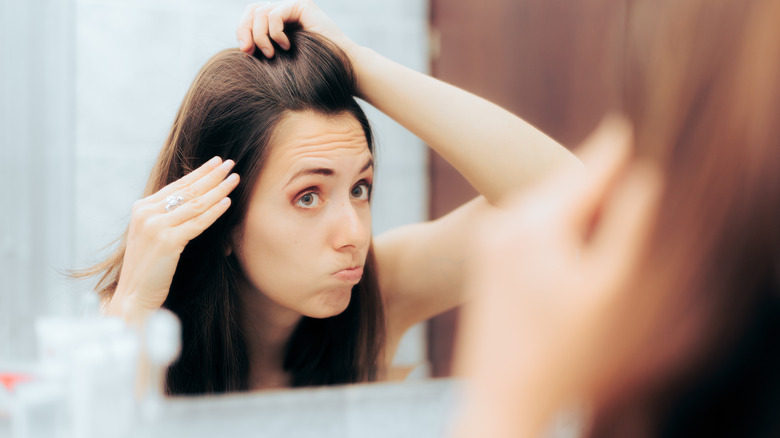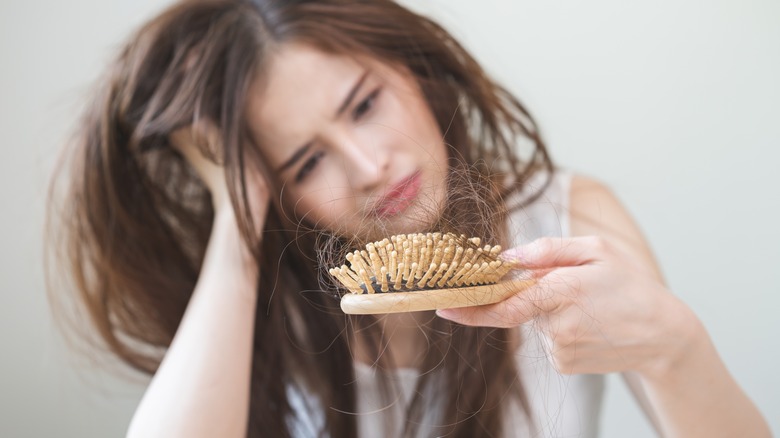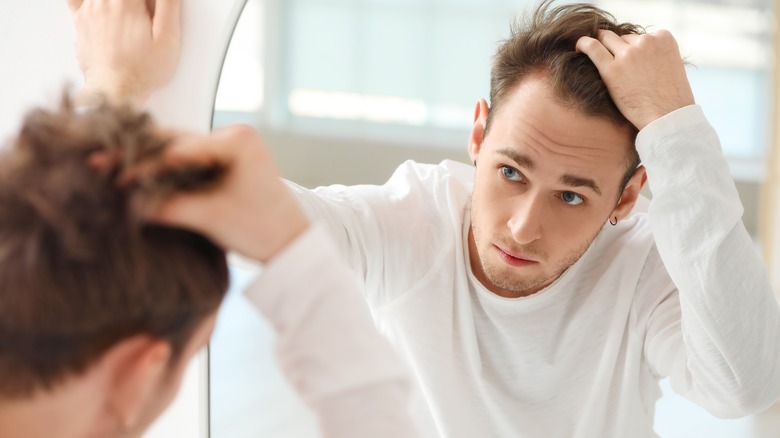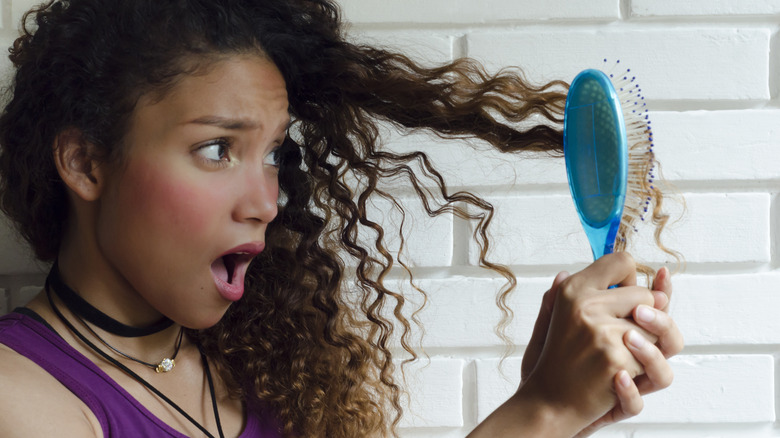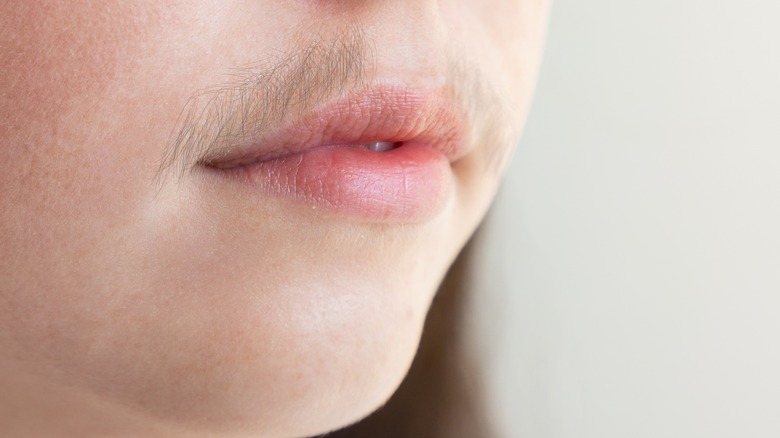Health Secrets Your Hair Can Tell You
Your hair is talking to you from morning until night. But are you listening to what it's saying? Many people don't realize that their hair can tell them quite a bit. In fact, everything from your hair's texture and color to its density and strength can provide fascinating — and sometimes critical — insights into your overall health and wellbeing.
What makes hair such a powerful tool for highlighting possible medical conditions or general wellness concerns? As noted in a 2023 article (via StatPearls), hair has value from a clinical perspective. The authors explain that the hair growth process requires many areas of the body to create the keratin-based hair shafts that we see. And it turns out that those shafts can frequently be predictors of clinical issues, including infections, reactions, and vitamin deficiencies.
The next time you look in the mirror, take a little time to examine your hair more thoroughly. You may just discover that it's giving you subtle (or maybe not-so-subtle) clues to your health.
Tresses can reveal stresses
Everyone undergoes stress now and then. However, repeated exposure to stressful conditions or trauma can lead to a hair problem called telogen effluvium (TE). According to an article published in 2024 (via StatPearls), TE is a reaction to stress that leads hair to fall out faster than it typically would. For instance, the American Academy of Dermatology Association (AAD) says that under normal conditions, a person will shed around 50-100 hairs daily. But someone with TE sheds much more hair — so much that the loss is quite noticeable.
There's good news, though: The AAD goes on to state that TE tends to be a temporary phenomenon. Once you move past your stressful situation, your hair will likely return to its regular thickness as it stops falling out. With that said, if you deal with your anxiety and still experience TE, you may want to see if your TE has been triggered by something else. Problems such as hormone fluctuations or a serious illness can also be root causes of TE.
Sun baking can cause hair breaking
Have you been frustrated by hair that keeps splitting or breaking? Does it seem like your hair is always dry, even after you apply tons of high-quality conditioners and serums? Perhaps your hair is trying to tell you to keep it out of the sun.
When hair is repeatedly exposed to ultraviolet (UV) rays, it can start to break down. Although your hair can't technically get a sunburn like your skin can, it can begin to lose its luster due to progressive and cumulative damage. Dermatologist Dr. Wilma Bergfeld expounds on why direct sunlight isn't a friend to hair (via Cleveland Clinic): "If your hair has prolonged exposure to the sun, UVA and UVB rays can damage [...] the cuticle." She adds that without intervention, the hair can become irreversibly bleached or gray.
To fix this issue, experts at GoodRx Health advise wearing something on your head, using an umbrella, or staying out of the sun during the hottest points of the day. They also recommend taking measures to keep your scalp from getting burned, such as using a sunscreen powder so your hair doesn't get greasy and the top of your head is well-protected.
Low vitamin D can contribute to lacking locks
Want to increase the long-lost shine and resilience of your hair? Consider talking with your healthcare provider about the value of increasing your intake of vitamin D. Researchers have studied the potential link between vitamin D and hair growth (or loss) for years. In a 2017 analysis published in Dermatology Practical and Conceptual, mice who were systematically deprived of vitamin D started losing their hair. The researchers determined that the reason for their thinning hair was a vitamin D deficient diet.
Does this mean that you can just take in more vitamin D and suddenly have a luscious mane? Maybe not right away, but it might happen, at least to some extent. A 2021 review (via Cureus) concluded that both ingested and topical versions of vitamin D have shown promise as treatments for hair loss. And a 2021 article published in the Journal of Nutritional Science and Vitaminology found that female subjects with hair loss who were given regular oral doses of vitamin D3 had significant hair regrowth.
However, vitamin D won't necessarily cure male-pattern baldness or bring back lost hair. Still, it could be worth a shot if you're balding in places.
Easily pulled out hair may indicate dental problems
Although most individual strands of hair can be pulled out fairly easily, they shouldn't just "give" without any resistance. Therefore, if your hair easily pulls out by the roots, you shouldn't ignore the phenomenon since it could mean your teeth are at risk of developing cavities.
Though at first glance dental enamel and keratin might not seem to have commonalities, they do: They both require protein to develop. According to researchers from the University of Washington School of Medicine, proteins are required to create tooth enamel (via Science Daily). And, as Healthline explains, because hair follicles are made up of protein, they can't function as expected if they're deprived of protein.
Similarly, a study in a 2014 edition of the Journal of Clinical Investigation noted that there seemed to be a correlation between people with weak dental enamel and insufficient levels of hair keratin. In other words, when you can pull your hair out without an issue, you may want to schedule an appointment with a dentist.
Excess hair can have hormonal origins
Not all hair worries have anything to do with breakage, thinning, or brittleness. Hirsutism, or hair that grows in unexpected places, can be alarming, particularly for women. The Mayo Clinic identifies the condition as one that causes male-pattern hair growth in females. For instance, a woman diagnosed with hirsutism might grow a substantial amount of hair around her mouth or on her chin, stomach, or chest.
Though hirsutism can happen for a variety of reasons, it is a symptom of a hormonal condition affecting women called polycystic ovarian syndrome (PCOS). Women who are diagnosed with PCOS have overactive ovaries. The ovaries go into overdrive, flooding the body with an imbalanced mix of hormones, according to the Cleveland Clinic. In response to the deluge of hormones, the body starts to grow hair in unusual places. Though hirsutism doesn't always accompany PCOS, it's a known symptom for about 7 in every 10 PCOS patients.
This doesn't mean you're destined to be told you have PCOS if you have hirsutism. The Cleveland Clinic notes that some cases of hirsutism can be due to genetics. And non-PCOS-related hirsutism can be addressed in several ways, including dropping weight, going on birth control pills, and undergoing laser hair removal therapy.
